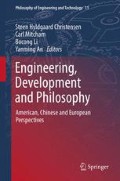Abstract
Ever since institutions for educating engineers first began to be established in Europe, there have been a number of fundamental tensions as to how that educating should best be conducted, what it should consist of, and who should do the educating. These tensions are based on different styles or approaches to engineering education that have developed historically in different parts of Europe and which have led to what we characterize as “theory-driven,” “practice-driven,” and “technology-driven” approaches. This chapter explores some of the historical roots of these tensions in medieval Europe and briefly traces their developmental trajectories through the subsequent formation of institutions of engineering education. It has been written as part of PROCEED (Program of Research on Opportunities and Challenges in Engineering Education in Denmark).
Access this chapter
Tax calculation will be finalised at checkout
Purchases are for personal use only
References
Crawford, Stephen. 1996. The making of the French engineer. In Engineering labour: Technical workers in comparative perspective, ed. Peter Meiksins and Chris Smith. London: Verso.
Davies, Norman. 1996. Europe. A history. Oxford: Oxford University Press.
Gibbons, Michael, et al. 1994. The new production of knowledge. London: Sage.
Gimpel, Jean. 1976. The medieval machine. The industrial revolution in the middle ages. New York: Holt, Rinehart and Winston.
Gispen, Kees. 2002. New profession, old order: Engineers and German society, 1815–1914. Cambridge: Cambridge University Press, 1990.
Heymann, Matthias. 2005. ‘Kunst’ und Wissenschaft in der Technik des 20. Jahrhunderts: Zur Geschichte der Konstruktionswissenschaften. Zurich: Chronos.
Heymann, Matthias. 2009. “Art” or science? Competing claims in the history of engineering design. In Engineering in context, ed. Steen Hyldgaard Christensen, Bernard Delahousse, and Martin Meganck. Aarhus: Academica.
Hård, Mikael. 1998. German regulation: The integration of modern technology into national culture. In The intellectual appropriation of technology. Discourses on modernity, 1900–1939, ed. Mikael Hård and Andrew Jamison. Cambridge, MA: The MIT Press.
Hård, Mikael, and Andrew Jamison. 2005. Hubris and hybrids. A cultural history of technology and science. New York: Routledge.
Jakobsen, Kjetil, et al. 1998. Engineering cultures: European appropriations of Americanism. In The intellectual appropriation of technology. Discourses on modernity, 1900–1939, ed. Mikael Hård and Andrew Jamison. Cambridge, MA: The MIT Press
Jamison, Andrew. 1982. National components of scientific knowledge. A contribution to the social theory of science. Lund: Research Policy Institute.
Jamison, Andrew. 1987. National styles in science and technology: A comparative model. Sociological Inquiry 57: 2.
Jamison, Andrew. 1991. National styles in technology policy: Comparing the Danish and Swedish state programmes in microelectronics/information technology. In State policies and techno-industrial innovation, ed. Ulrich Hilpert. London: Routledge.
Jamison, Andrew. 2009. The historiography of engineering contexts. In Engineering in context, ed. Steen Hyldgaard Christensen, Bernard Delahousse, and Martin Meganck. Aarhus: Academica.
Jamison, Andrew, and Niels Mejlgaard. 2010. Contextualizing nanotechnology education: Fostering a hybrid imagination in Aalborg, Denmark. Science as Culture 19: 3.
Jørgensen, Ulrik. 2007. Historical accounts of engineering education. In Rethinking engineering education: The CDIO approach, ed. Crawley Edward et al. New York: Springer.
Lilley, Samuel. 1973. Technological progress and the industrial revolution 1700–1914. In The Fontana economic history of Europe. The industrial revolution, ed. Carlo Cipolla. Glasgow: Fontana.
Long, Pamela. 2001. Openness, secrecy, authorship. Technical arts and the culture of knowledge from antiquity to the renaissance. Baltimore/London: The Johns Hopkins University Press.
Noble, David. 1997. The religion of technology. The divinity of man and the spirit of invention. New York: Knopf.
Ovitt, George. 1987. The restoration of perfection. Labor and technology in medieval culture. New Brunswick: Rutgers University Press.
Polanyi, Michael. 1958. Personal knowledge. Towards a post-critical philosophy. London: Routledge & Kegan Paul.
Redtenbacher, Ferdinand. 1852. Prinzipien der Mechanik und des Maschinenbaues. Mannheim: Bassermann.
Reuleaux, Franz. 1875. Theoretische Kinematik. Bd 1, Grundzüge einer Theorie des Maschinenwesens. Braunschweig: Vieweg.
Rietbergen, Peter. 1998. Europe. A cultural history. London: Routledge.
Sawday, Jonathan. 2007. Engines of the imagination. Renaissance culture and the rise of the machine. London: Routledge.
Smith, Chris, and Peter Whalley. 1996. Engineers in Britain: A study in persistence. In Engineering labour: Technical workers in comparative perspective, ed. Peter Meiksins and Chris Smith. London: Verso.
Veblen, Thorstein. 1915/1968. Imperial Germany and the industrial revolution. Ann Arbor: The University of Michigan Press.
White, Lynn. 1978. Medieval religion and technology. Collected essays. Berkeley: University of California Press.
Author information
Authors and Affiliations
Corresponding author
Editor information
Editors and Affiliations
Rights and permissions
Copyright information
© 2012 Springer Science+Business Media Dordrecht
About this chapter
Cite this chapter
Jamison, A., Heymann, M. (2012). Historical Tensions in Engineering Education: European Perspectives. In: Christensen, S., Mitcham, C., Li, B., An, Y. (eds) Engineering, Development and Philosophy. Philosophy of Engineering and Technology, vol 11. Springer, Dordrecht. https://doi.org/10.1007/978-94-007-5282-5_11
Download citation
DOI: https://doi.org/10.1007/978-94-007-5282-5_11
Published:
Publisher Name: Springer, Dordrecht
Print ISBN: 978-94-007-5281-8
Online ISBN: 978-94-007-5282-5
eBook Packages: EngineeringEngineering (R0)

